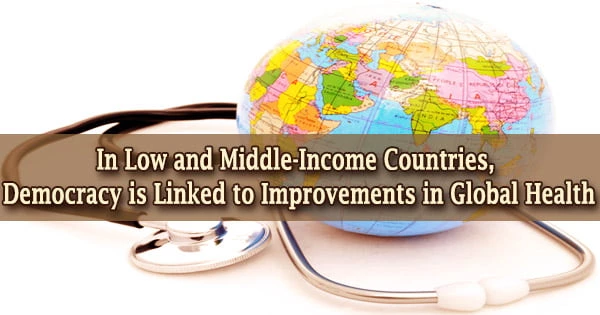The majority of research that examines whether democracy promotes global health depends on birth rates and infant death rates. However, improvement in infectious diseases such as malaria, diarrheal disorders, and pneumonia, which rely significantly on foreign help, is disproportionately reflected in those measurements.
According to recent research coordinated by Stanford Medicine and the Council on Foreign Relations, examining the causes of adult mortality, such as noncommunicable illnesses, HIV, cardiovascular disease, and transportation accidents, is a better approach to quantify the effect of democracy in public health. These non-communicable illnesses receive very little international aid.
The results were startling when the researchers assessed gains in those specific areas of public health. “The results of this study suggest that elections and the health of the people are increasingly inseparable,” the authors wrote.
Democratic institutions and processes, and particularly free and fair elections, can be an important catalyst for improving population health, with the largest health gains possible for cardiovascular and other non-communicable diseases.
Tara Templin
The findings will be described in a report published in The Lancet on March 13th. Tara Templin, a doctoral student in health research and policy at Stanford Health Policy, co-wrote the paper with Thomas Bollyky, JD, head of the Council on Foreign Relations Global Health Program.
“Democratic institutions and processes, and particularly free and fair elections, can be an important catalyst for improving population health, with the largest health gains possible for cardiovascular and other non-communicable diseases,” the authors wrote.
The study, according to Templin, adds to the body of knowledge on how governance and health impact global health policy discussions, which is increasingly important as global health financing stagnates.
“As more cases of cardiovascular diseases, diabetes and cancers occur in low and middle-income countries, there will be a need for greater health care infrastructure and resources to provide chronic care that wasn’t as critical in providing childhood vaccines or acute care,” Templin said.
Free and fair elections for better health
In 2016, the four most ameliorated mortality causes among low and middle-income countries were cardiovascular disease, TB, transportation injuries, and other non-communicable illnesses, which accounted for 25% of total death and disability in persons under the age of 70. In the same year, 14 million people died in those nations from cardiovascular illnesses, with 42 percent of the fatalities occurring in those under the age of 70.
According to the authors, the growth in democratic experience has lowered mortality from cardiovascular disease, other noncommunicable illnesses, and TB in these nations by 8-10% during the last 20 years.
“Free and fair elections appear important for improving adult health and noncommunicable disease outcomes, most likely by increasing government accountability and responsiveness,” the study said.
The Global Burden of Diseases, Injuries, and Risk Factors Study, V-Dem, and Financing Global Health databases were used by the researchers. From 1970 to 2015, the data covers 170 nations.
Democracy was linked to improved noncommunicable disease outcomes, according to Templin and her co-authors. They believe that under democracies, healthcare investments will be given more importance.
For example, as nations moved to democracy, HIV-free life expectancy at age 15 improved on average by 3% per ten years over the research period. According to the study, democratic experience also explains large reductions in mortality from cardiovascular illness, TB, transportation-related accidents, malignancies, cirrhosis, and other non-communicable diseases. Despite this, the link between free and fair elections and global health is poorly understood.
“Democratic government has not been a driving force in global health,” the researchers wrote. “Many of the countries that have had the greatest improvements in life expectancy and child mortality over the past 15 years are electoral autocracies that achieved their health successes with the heavy contribution of foreign aid.”
Between 1996 and 2016, Ethiopia, Myanmar, Rwanda, and Uganda all increased their life expectancy by at least ten years. These countries’ administrations, on the other hand, were chosen in multiparty elections in which the opposition could only lose, putting them among the least democratic countries on the planet.
Yet these nations were among the top two-dozen recipients of foreign assistance for health.
Noncommunicable illnesses, which were responsible for 58 percent of deaths and disabilities in low- and middle-income countries in 2016, received just 2% of overall development aid for health in 2016, according to the study.
“Although many bilateral aid agencies emphasize the importance of democratic governance in their policy statements,” the authors wrote, “most studies of development assistance have found no correlation between foreign aid and democratic governance and, in some instance, a negative correlation.”
When their populations’ health demands switched to treating and preventing noncommunicable illnesses, autocracies like Cuba and China, who are recognized for delivering superb health care at minimal cost, have not always been as effective.
According to a 2017 study, China’s genuine life expectancy was lower than its anticipated life expectancy at birth between 1980 and 2000, and has only risen over the last decade as a result of increasing government health spending. Cuba’s observed life expectancy has declined from four to seven years longer than predicted in 1970 to three to five years longer than expected in 2016.
“There is good reason to believe that the role that democracy plays in child health and infectious diseases may not be generalizable to the diseases that disproportionately affect adults,” Bollyky said.
According to Bollyky, cardiovascular illnesses, malignancies, and other noncommunicable diseases are primarily chronic, more expensive to treat than most infectious diseases, and need more health-care infrastructure and experienced medical workers. The researchers hypothesize that democracy improves population health because:
Democracies should have a higher motivation than autocracies to give health-promoting resources and services to a wider proportion of the population if they are enforced through regular, free, and fair elections.
- Democracies are more receptive to input from a larger range of stakeholders, are more protective of media freedom, and maybe more ready to use that input to enhance public health initiatives.
- Political competition and access to information are reduced under autocracies, which may prevent constituent input and responsive government.
Several studies have found that democratic leadership improves population health, although virtually all of them have focused on newborn and child mortality or life expectancy at birth.
According to the authors, the average country’s growth in democracy lowered cardiovascular disease mortality by 10% over the last 20 years. They predict that between 1995 and 2015, more than 16 million cardiovascular deaths might have been avoided owing to a rise in democracy throughout the world.
They also discovered improvements in other health burdens in countries where democracy has taken hold: an 8.9% drop in tuberculosis deaths, a 9.5 percent drop in transportation-related deaths, and a 9.1% mortality reduction in noncommunicable diseases like congenital heart disease and congenital birth defects.
“This study suggests that democratic governance and its promotion, along with other government accountability measures, might further enhance efforts to improve population health,” the study said. “Pretending otherwise is akin to believing that the solution to a nation’s crumbling roads and infrastructure is just a technical schematic and cheaper materials.”
The study included contributions from other Council on Foreign Relations experts, as well as academics from the University of Washington-Seattle and Bilkent University in Turkey. Bloomberg Philanthropies and the Bill and Melinda Gates Foundation provided funding for the study. The investigation was also financed by Stanford’s Department of Health Research and Policy.
















